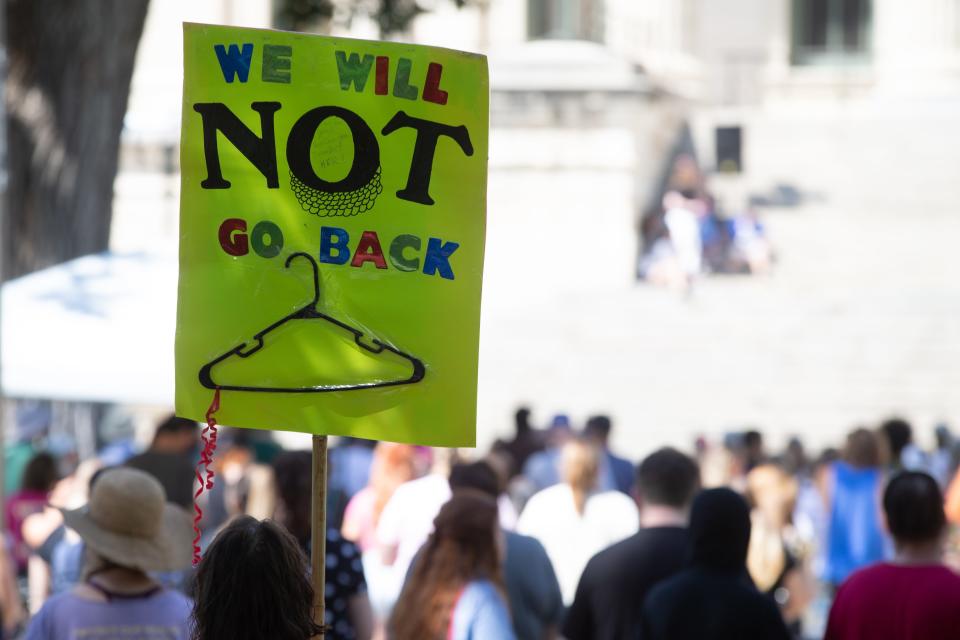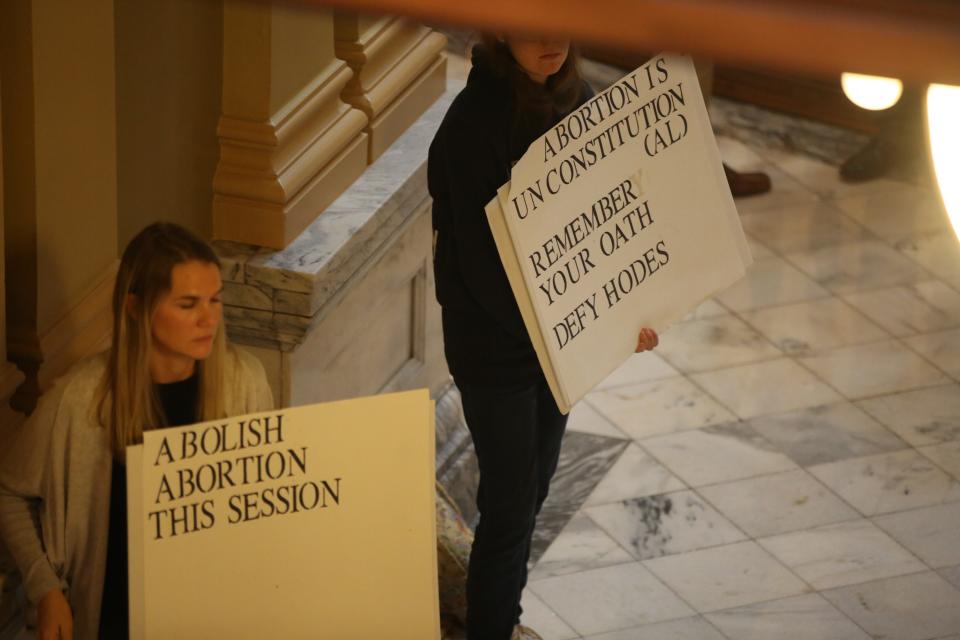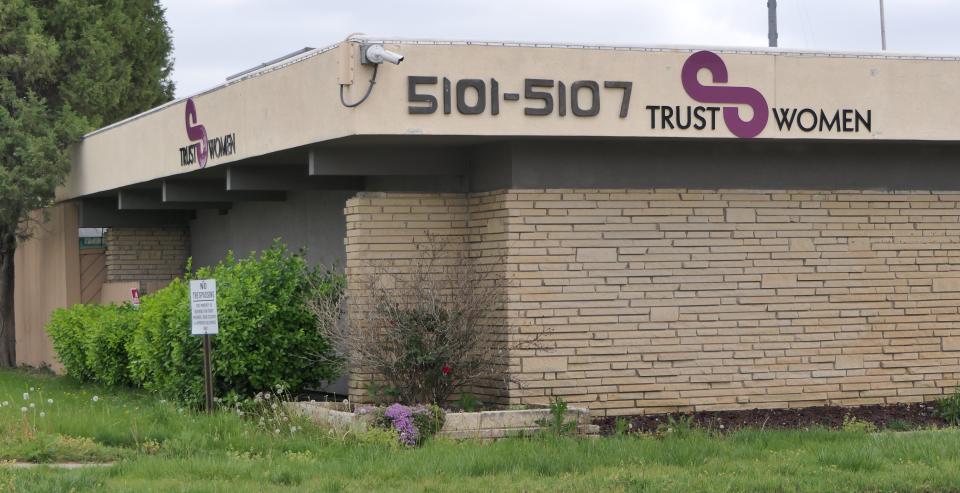Voters in Kansas rejected an abortion amendment after Roe fell, but the debate is far from over
In August, Kansas voters went to the polls with the eyes of the nation upon them. Abortion, long an issue which had divided the state, had transfixed the country and the Sunflower State was the first one where the matter was on the ballot.
Voters on Aug. 2 defied expectations by rejecting a measure that would have eroded constitutional abortion rights protections in Kansas.
But the issue remains a live one in Kansas, as lawmakers are said to be considering running with a variety of abortion-related measures when they return to Topeka next week for the annual legislative session.
Abortion pills: Abortion pills for early pregnancy can be dispensed at pharmacies, FDA says

Rumors have flown around the Statehouse that this might include a potential effort to implement a ban on abortions after 15 weeks, a measure that would almost certainly prompt a legal challenge, even if it were to become law.
Other options exist as well, including more funding for so-called crisis pregnancy centers, that would be less likely to run into a legal barrier.
Kansans for Life, the state's top anti-abortion group, said they plan to share details of their legislative agenda publicly once the session begins.
"Kansans for Life will never stop pursuing stronger protections for women and preborn babies along with better ways to ensure access to the support they deserve," Danielle Underwood, the group's communications director, said. "Meanwhile, the abortion industry and its allies are working to remove existing protections for women and babies that Kansans worked across the aisle to enact."
But make no mistake — the debate over abortion is far from over.
"Maybe there is some interest in trying to play some legal game," said Patrick Miller, a professor of political science at the University of Kansas. "But I think one thing to watch is what other abortion restrictions the Legislature tries to bring up."
Will further abortion restrictions be considered in Topeka?

The U.S. Supreme Court ruling in June that overturned Roe v. Wade, which protected abortion rights across the United States, triggered a renewed wave of attention, protest and legislating on the issue across the nation.
But the back-and-forth over the subject has been largely muted in the halls of the Statehouse since January 2021, when lawmakers voted to put the proposed constitutional amendment on the ballot.
That effort was, in turn, fueled by a 2019 Kansas Supreme Court ruling that said the Kansas Constitution confers a right to an abortion, setting up a much higher legal standard that all restrictions on the practice must meet.
That high bar has been used to nullify a ban on a common second trimester abortion procedure and, potentially, the state's halt on abortions performed via telemedicine.
Abortion laws in the US: Arizona appeals court rules abortions OK up to 15 weeks; doctors can’t be charged
Any new measures, such as a potential 15-week abortion ban, would need to capture overwhelming support from Republicans in order to overcome an expected veto from Gov. Laura Kelly. But they also would need to pass review from the state courts.
Top Republicans have, to date, been coy on their plans. Incoming House Speaker Dan Hawkins, R-Wichita, said he believed legislation further restricting abortion will get introduced — but whether anything will come of it remains uncertain.
"All of my 10 years here, there's always been an abortion ban bill every year," he told reporters in November. "Do they get heard? No. But there's always a bill that's introduced, and there will be a lot of bills be introduced. And, you know, then you have to evaluate."
Even some of the most ardent anti-abortion legislators say they are unconvinced that narrowing state law from the current ban on abortion, which kicks in at 22-weeks gestation, is a viable option.
"Would I like to see it personally? Yeah," sid Sen. Mike Thompson, R-Shawnee. "Is it possible given the Legislature? I don't know. That's my own personal faith and belief. But what can be done politically is a lot of times another story. So we have to take a look and see where we can go and what kind of advancements we can make there."
Meanwhile, Sen. Mark Steffen, R-Hutchinson, has already pre-filed a bill that would prohibit "the prescribing of drugs intended to cause an abortion using telemedicine."
The state's current restrictions on telemedicine abortion, which requires the first dose of the abortion medication mifepristone be administered by a doctor in the same room as a patient, was put on hold by a Shawnee County judge in November. Shortly thereafter, Planned Parenthood said they had begun conducting telemedicine abortions in the state.
Maternal health care: Inequities in maternal health care access are not new. They have deep roots in history.
Democrats have argued that any effort to further restrict abortion would be tantamount to a slap in the face of voters who rejected the abortion amendment in August.
"It's just, at this point, completely unnecessary," said Rep. Jo Ella Hoye, D-Lenexa, the top Democrat on the House committee that handles abortion policy. "Like we've had the voters weigh in. We actually know how they feel on this issue. And it's just a distraction from other things that we'll be working on."
Speaking with The Topeka Capital-Journal, Gov. Laura Kelly said she wanted to wait and see what specifics, if any, were proposed on the issue.
"There's no erasing the voice of the people, you know," Kelly said. "They made it very, very clear where they stand on an issue that the Legislature doesn't agree with them on, as a whole."
'Born-alive' bill could be on the abortion policy agenda in 2023

Other measures, both directly and indirectly related to abortion, are also likely to be on the table when legislators return to Topeka.
Gaining traction is a so-called "born alive" measure that mirrors a proposal rejected by Montana voters in November that would require medical providers to perform life-saving care for newborns, even if they were born after an induced abortion or caesarean section.
Proponents argue it is necessary to increase legal protections so that a baby who survives an abortion cannot be left uncared for, though such actions would already be barred under Kansas law. Statute requires doctors "must exercise the same skill, care, and diligence for infants who survive abortion" that would be given to any other child.
The Montana measure resembled model legislation proposed by the national anti-abortion group Americans United for Life, though the model bill text would allow parents to opt out of the requirements for physicians.
Abortion in Kansas:Churches spoke loudly and spent big, only to lose abortion vote. Will anything change?
"I think there's a chance that we see that," Hawkins said. "Does that have a chance to pass muster with the courts? I think that does. I mean, that's a whole lot different."
But opponents of the Montana proposal argue its practical impact would have been divorced from abortion. Instead, they say, it would require doctors intervene even if a baby had unresolvable medical issues, taking a dying baby away from its parents in its last moments.
Zachary Gingrich-Gaylord, a spokesperson for Trust Women, a Wichita abortion clinic, said that born-alive bills are unnecessary, "inflammatory" and are "not backed by any kind of medicine or science."
"They're just another trap, a way to chip away at people's access and rights to access to reproductive health care," he said.
As abortion demand remains high in Kansas, funding for crisis pregnancy centers could be at stake
Lawmakers likely will also consider more funding for the Senator Stan Clark Pregnancy Maintenance Initiative, a state-funded program that is designed to support mothers to bring their pregnancy to term.
The program has received a relatively paltry amount of state funding for years; in the most recent fiscal year its funding came out to $350,000.
But money can't be given to any entity that performs, promotes or educates in favor of abortion and the grants are given out in part based on which regions of the state have the most abortions. And at least two crisis pregnancy centers received funding in the most recent fiscal year.
Crisis pregnancy centers: Latinas have long been targeted by abortion misinformation. It's getting worse, experts say.
Chuck Weber, executive director of the Kansas Catholic Conference, predicted after the August vote that the program, as well as support for crisis pregnancy centers more broadly, would be a top priority.
The centers are routinely criticized for offering misleading or false information on abortion or pregnancy issues. Supporters say they are an effective way of connecting women with services and support to bring their baby to term.
"Now that (the amendment) has been defeated, at least for the time being, we are going to almost certainly see an influx of women and girls coming into Kansas for abortions," Weber said in August. "We want to provide for them alternatives, the resources and the alternatives, so that they bring their child into the world and then not only bring their child into the world, but also thrive and prosper with that child and help show them that life is a beautiful thing, that a child is not a disease."
Abortion clinics have seen a surge of patients even dating back to severe abortion restrictions approved in Texas in 2021, with volume rising steadily since Roe was overturned.
Planned Parenthood has opened a third clinic in the state in Kansas City, Kan., as a response to the demand. For Trust Women, one day in December brought 16,000 phone calls to both of its clinics in Kansas and Oklahoma. While the Wichita clinic once focused on Kansas patients, 70% now come from out-of-state.
"We are doing what we can to just increase capacity in what is essentially a permanent bottleneck," Gingrich-Gaylord said.
The August vote was unique in that it was a rare instance where a singular issue was presented to Kansas voters. Perhaps paradoxically, voters again elected a Republican supermajority in the Kansas House in November, a move that could have ramifications on what policies lawmakers eventually elect to pursue on the issue.
But Hoye said she believed that Kansans would not stop paying attention as Aug. 2 continues to recede into the state's collective memory.
"People show up when there's an issue on the ballot, and don't always connect that with particular elected officials," she said. "So some of that is up to us to educate, you know, how we're standing up for people's rights, how we're protecting that constitutional right to an abortion that we have in Kansas and taking that seriously."
This article originally appeared on USA TODAY: After abortion vote, Kansas Legislature set to consider restrictions

